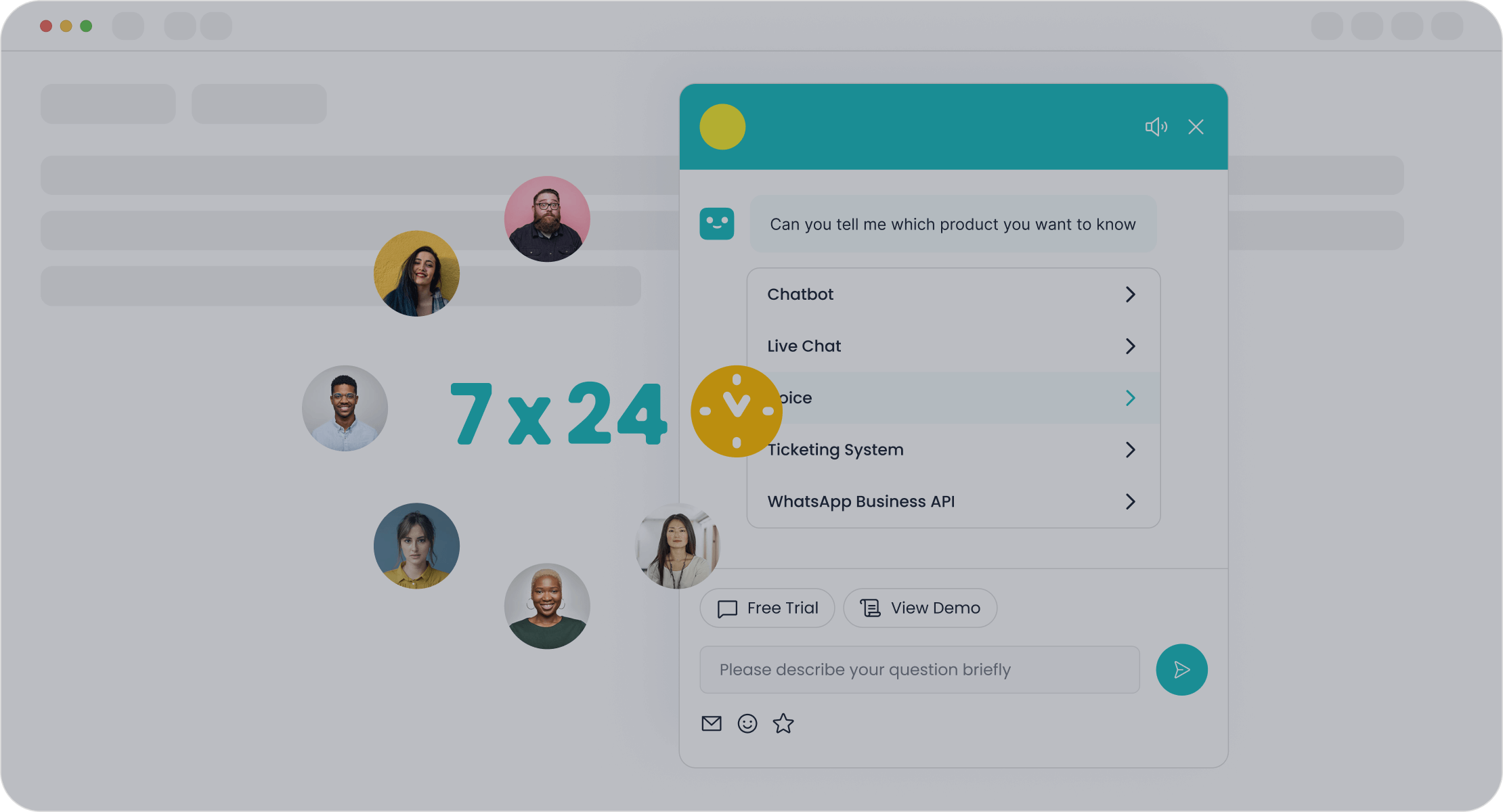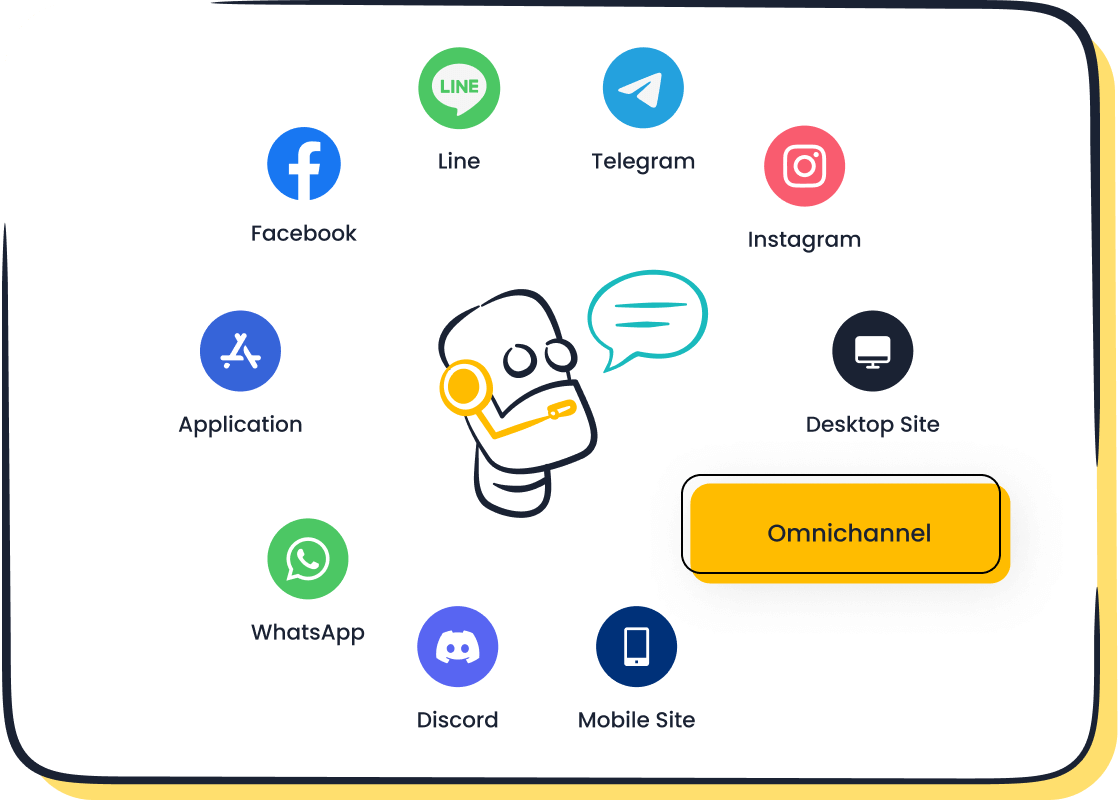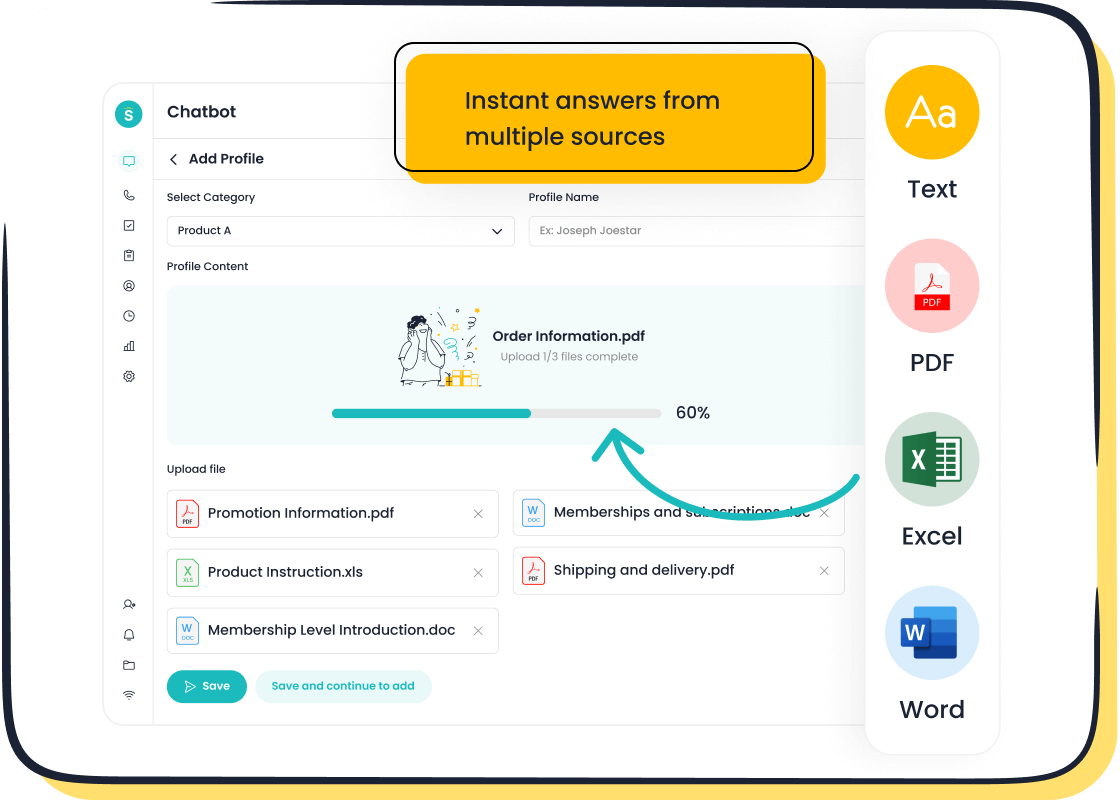Modern AI Systems for Customer Complaint Handling in 2025

AI has become a game-changer in customer complaint handling, reshaping how businesses address customer concerns. By 2025, 95% of customer interactions are expected to involve AI-powered systems, demonstrating its growing dominance. Companies using AI report a 37% reduction in first response times, which significantly enhances customer satisfaction. AI-driven automation identifies common issues and delivers proactive support, preventing dissatisfaction before it arises.

Human agents now focus on complex problems, while AI efficiently handles repetitive inquiries. For example, Sobot's AI Chatbot operates 24/7, autonomously resolving queries and assisting agents. This approach improves productivity by 70% and reduces costs by up to 50%. With 79% of customer service specialists recognizing AI's importance, adopting these solutions is no longer optional. Businesses must embrace AI to stay competitive and foster stronger customer relationships.
The Current Landscape of AI in Customer Complaint Handling
Adoption of AI in Customer Service
Industries leading the way in AI-driven automation.
AI adoption has surged across industries, transforming how businesses handle customer complaints. Retail and telecommunications lead the way, leveraging AI to streamline customer service processes. For instance, Airbnb uses AI to prioritize and sort customer inquiries, ensuring faster resolutions and improved customer satisfaction. Gartner predicts that by next year, 85% of customer interactions will involve AI tools, showcasing the growing reliance on AI-driven automation. This trend highlights the importance of adopting AI to stay competitive in today’s market.
The growing reliance on AI for customer complaint handling.
Businesses increasingly depend on AI to manage customer complaints effectively. Nearly half of all client support units now use AI technology, with 52% of contact centers investing in conversational AI. Popular applications include routing requests, analyzing feedback, and deploying chatbots. Companies also use AI to enhance customer engagement, streamline workflows, and reduce wait times. These advancements demonstrate how AI-driven customer service is reshaping the industry, offering faster and more efficient solutions.
Benefits of AI in Complaint Management
Faster response times and 24/7 availability.

AI ensures faster response times by automating routine tasks and providing 24/7 support. AI-powered chatbots like Sobot’s Chatbot handle thousands of queries simultaneously, even during peak hours. This reduces wait times and ensures customers receive immediate assistance. Call centers using AI report a 27% boost in customer satisfaction scores, proving its effectiveness in enhancing response times and availability.
Enhanced customer satisfaction through personalized solutions.
AI improves customer satisfaction by delivering personalized solutions. It analyzes customer data to understand preferences and tailor responses accordingly. For example, AI can predict customer needs and offer proactive support, creating a seamless customer experience. Sobot’s Chatbot excels in this area, using real-time intent assistance to boost conversions by 20% while maintaining high levels of customer engagement.
Cost savings and operational efficiency.
AI reduces operational costs by automating repetitive tasks and optimizing workforce schedules. It predicts call volumes, enabling better resource allocation and minimizing unnecessary labor costs. Businesses using AI also benefit from data-driven insights that optimize support strategies. Sobot’s Chatbot, for instance, saves up to 50% on additional agent costs while improving productivity by 70%. These efficiencies make AI an invaluable tool for modern customer complaint handling.
Key AI Technologies Transforming Complaint Handling
Chatbots and Virtual Assistants
The role of Sobot's Chatbot in automating complaint resolution.

AI-powered chatbots have revolutionized customer service by automating repetitive tasks and providing instant support. Sobot's Chatbot exemplifies this transformation. It operates 24/7, handling thousands of queries simultaneously across multiple channels like WhatsApp and SMS. By resolving routine complaints autonomously, it allows human agents to focus on complex issues. For example, OPPO, a global smart device leader, achieved an 83% chatbot resolution rate using Sobot's Chatbot. This integration not only improved customer satisfaction but also reduced operational costs significantly. Businesses adopting such AI-driven systems can streamline complaint handling and enhance overall efficiency.
Advanced chatbot capabilities in 2025.
Chatbots in 2025 have evolved into conversational virtual agents with advanced capabilities. They now understand nuanced conversations and respond in a human-like manner, thanks to improvements in natural language processing. These AI-powered chatbots also integrate seamlessly with e-commerce platforms, answering complex queries and facilitating transactions. Enhanced payment functionalities make them indispensable for modern businesses.
| Advancement Type | Description |
|---|---|
| Natural Language Processing Improvements | Chatbots will understand more nuanced conversations and respond in a more human-like manner. |
| Integration in E-Commerce and Customer Service | Chatbots will enhance customer satisfaction by providing 24/7 support and answering complex queries. |
| Enhanced Payment Functionalities | Chatbots will evolve to include robust payment integrations, making transactions easier for users. |
Sentiment Analysis
Understanding customer emotions for better complaint handling.
Real-time sentiment analysis has become a cornerstone of personalized service. By analyzing customer emotions, AI helps you tailor responses to create personalized experiences. This approach improves customer satisfaction and fosters loyalty. For instance, identifying frustration in a customer's tone allows you to address their concerns promptly, preventing escalation. Continuous monitoring of sentiment also provides valuable insights for refining your products and services.
- Improve customer experience: Personalized and efficient customer service enhances overall customer satisfaction, leading to loyalty and recommendations.
- Prompt customer service: Real-time sentiment analysis helps identify and address customer issues swiftly, preventing escalation into larger problems.
- Personalized interactions: Tailoring responses based on customer emotions fosters stronger relationships and improves communication.
- Continuous monitoring: Ongoing sentiment analysis provides valuable insights for product and service improvements based on customer feedback.
Real-time sentiment tracking to improve responses.
AI-driven sentiment tracking enables businesses to adjust their approach dynamically. For example, Convin's AI Phone Calls analyze customer sentiment in real time, helping agents resolve negative situations quickly. Continuous assessment of sentiment scores provides accurate insights, improving service personalization. Integration with existing systems streamlines operations, enhancing the overall customer experience. These advancements ensure that your customer complaint handling remains efficient and empathetic.
Predictive Analytics
Anticipating customer complaints before they arise.
Predictive analytics empowers businesses to foresee potential issues by analyzing data from various sources like feedback and social media. For instance, if a customer complains about a shipping delay online, predictive tools can identify similar cases and enable proactive communication. This approach not only resolves complaints faster but also builds a reputation for excellent service. AI-driven analytics also identify common complaint patterns, allowing you to address root causes and enhance customer trust.
Proactive solutions to reduce complaint volume.
Proactive solutions enabled by predictive analytics reduce complaint volumes significantly. For example, Coca-Cola uses predictive tools to foresee supply chain disruptions, while Delta Air Lines adjusts staffing levels based on flight schedules. These strategies ensure seamless operations and improve customer satisfaction. By leveraging predictive analytics, you can anticipate customer needs, deliver personalized experiences, and maintain a competitive edge in customer service.
- Predictive analytics can identify potential customer issues by analyzing data from surveys, service tickets, and social media interactions. For instance, if a customer complains about a shipping delay on social media, businesses can proactively address the issue by reaching out to affected customers.
- Netflix employs predictive analytics to personalize user experiences by analyzing viewing history and preferences, which helps in recommending shows and movies tailored to individual tastes.
- Missouri Star Quilt Co. leverages predictive analytics to identify customers likely to make purchases, allowing them to provide personalized recommendations and enhance customer engagement.
Natural Language Processing (NLP)
Enhancing AI's ability to understand complex queries.
Natural Language Processing (NLP) plays a critical role in improving AI's ability to handle customer complaint handling effectively. It allows AI to interpret and respond to complex queries with remarkable accuracy. By leveraging advanced techniques, NLP ensures that AI systems can understand the intent behind customer inquiries, even when phrased in unconventional ways.
- NLP uses syntactic analysis to identify grammatical structures, ensuring AI can process sentences accurately.
- Semantic analysis focuses on the meaning and context of words, helping AI deliver relevant responses.
- Intent classification categorizes customer inquiries into predefined intents, improving response efficiency.
- Entity recognition extracts specific details, such as names or dates, enabling AI to provide targeted solutions.

For example, Sobot's AI Chatbot uses NLP to analyze customer queries and deliver precise answers. This capability allows it to handle nuanced questions, such as those involving product specifications or troubleshooting steps. By understanding the context, the chatbot ensures customers receive accurate and helpful responses, reducing the need for human intervention. This not only enhances customer satisfaction but also streamlines your operations.
Multilingual support for global customer bases.
As businesses expand globally, multilingual support becomes essential for effective customer complaint handling. NLP enables AI to communicate seamlessly in multiple languages, ensuring customers feel understood regardless of their location. However, implementing multilingual AI systems comes with challenges.
- Dialects and linguistic variations can lead to misunderstandings if not addressed properly.
- Maintaining response accuracy across languages is crucial, especially in sensitive industries like healthcare or finance.
- Computational costs can pose barriers for smaller businesses adopting multilingual AI.
- Overcoming cultural and contextual differences ensures effective communication across diverse regions.
Sobot's AI Chatbot excels in multilingual support, interacting with customers in their preferred language. It handles over 50 languages, making it ideal for businesses with a global presence. For instance, OPPO, a leading smart device company, uses Sobot's chatbot to serve customers across 60 countries. This capability has helped OPPO achieve a 94% positive feedback rate, demonstrating the importance of multilingual AI in fostering customer satisfaction.
Challenges in Implementing AI for Complaint Management
Data Privacy and Security
Protecting sensitive customer information.
AI systems process vast amounts of sensitive data, including personal and financial details. Protecting this information is critical to maintaining trust. You must implement robust security measures to prevent unauthorized access or misuse. For example, encryption and multi-factor authentication can safeguard customer data. Additionally, transparency in how AI handles data reassures users about its ethical use. Many organizations also adopt privacy-by-design principles, ensuring data protection is integrated into AI systems from the start.
- AI solutions must comply with regulations like GDPR or CCPA.
- Handling complaints involves sensitive data, making privacy a top priority.
- Clear policies and safeguards protect data from breaches or misuse.
Compliance with global data protection regulations.
Adhering to global data protection laws is essential when implementing AI in customer service. You need to understand the legal landscape in each jurisdiction where your business operates. For instance, GDPR in Europe and CCPA in California require organizations to obtain consent and provide clear notices about data usage. Regular audits and assessments ensure compliance.
| Compliance Mechanism | Description |
|---|---|
| Standard Contractual Clauses | Legal contracts to ensure data protection during transfers. |
| Binding Corporate Rules | Internal policies for multinational companies to ensure compliance. |
| Adequacy Decisions | Recognitions by the EU that a non-EU country provides adequate data protection. |
| Data Transfer Impact Assessments | Evaluations to assess risks associated with data transfers. |
Ethical Concerns
Avoiding bias in AI algorithms.
AI systems can inherit biases from the data they are trained on. This can lead to unfair treatment of customers. For example, historical data may prioritize certain requests over others, disadvantaging non-native speakers or minority groups. You must ensure that AI algorithms are trained on diverse datasets to minimize bias. Regular testing and updates help maintain fairness in customer service interactions.
- AI bias can result in unequal treatment of customers.
- Algorithmic bias often stems from historical data.
- Diverse training datasets reduce the risk of biased outcomes.
Ensuring fairness and transparency in AI-driven decisions.
Fairness and transparency are vital for building trust in AI systems. Intelligent complaint routing ensures that issues are directed to the right department for resolution. Sentiment analysis prioritizes urgent complaints, improving customer satisfaction. Additionally, AI can assess compensation amounts fairly, ensuring consistent outcomes. By explaining AI-driven decisions to customers, you foster trust and accountability.
- AI supports fair complaint handling through predictive analytics and sentiment analysis.
- Transparent decision-making builds trust with customers.
- Tailored responses improve overall service quality.
Balancing AI and Human Oversight
The importance of human empathy in AI customer service.
AI excels at handling routine inquiries, but human empathy remains irreplaceable in customer service. You need human agents to address complex or emotional complaints. For example, Article 22 of GDPR grants individuals the right to human intervention in automated decisions. This ensures accountability and builds trust. A human-in-the-loop approach combines AI efficiency with the emotional intelligence of human agents, delivering high-quality service.
- Human agents handle nuanced or high-value interactions.
- Oversight ensures compliance with legal requirements like GDPR.
- Empathy strengthens customer relationships.
Addressing complex or emotionally charged complaints.
Emotionally charged complaints require a personal touch. AI can use sentiment analysis to identify these cases and escalate them to human agents. For instance, automating ticketing systems streamlines complaint management, while human agents provide personalized resolutions. This hybrid approach ensures that customers feel valued and understood, even in challenging situations.
- Sentiment analysis prioritizes urgent complaints.
- Human agents personalize interactions for better outcomes.
- Combining AI and human efforts improves resolution experiences.
Best Practices for Integrating AI into Complaint Management
Hybrid Models for AI and Human Collaboration
Combining AI-driven automation with human touch.

Hybrid models combine the efficiency of AI with the empathy of human agents, creating a balanced approach to complaint management. AI tools like Sobot's Chatbot handle routine inquiries, freeing human agents to focus on complex or emotionally sensitive issues. This collaboration improves workflows and builds trust with customers. For example, AI can provide real-time assistance to agents by suggesting solutions, while human agents deliver personalized experiences during critical interactions. This synergy ensures seamless service delivery and enhances customer satisfaction.
- AI manages straightforward tasks, reducing agent workload.
- Human agents address emotionally charged complaints with empathy.
- Collaboration between AI and humans creates efficient and meaningful customer service experiences.
Training staff to work alongside AI systems like Sobot's Chatbot.
To maximize the benefits of AI-human synergy, you must train your staff to collaborate effectively with AI systems. Start with simulation exercises to familiarize agents with AI interfaces. Gradual integration of AI tools, like Sobot's Chatbot, eases the transition and reduces resistance. Continuous learning programs keep your team updated on AI advancements, while data literacy training helps them leverage AI-driven insights. Proper training ensures your staff can confidently use AI to enhance customer service.
- Conduct simulation exercises to build familiarity with AI tools.
- Offer ongoing training to keep staff updated on AI capabilities.
- Teach data literacy to help agents utilize AI insights effectively.
Ensuring Data Quality and Accuracy
The importance of clean data for AI training.
High-quality data is the backbone of effective AI systems. Clean, consistent data ensures accurate analyses and predictions, enabling AI to deliver precise solutions. For example, Sobot's Chatbot relies on a well-maintained knowledge base to provide accurate responses. Regular data cleaning and processing prevent errors and biases, ensuring your AI systems remain reliable. As customer expectations evolve, updating your data ensures your AI stays relevant and effective.
Regular updates to AI models for optimal performance.
Regular updates keep your AI systems competitive and aligned with customer needs. Establish a training schedule for AI models using new data and customer behavior insights. Monitor performance metrics like accuracy and response time to identify areas for improvement. Feedback loops from customer interactions help refine AI models, ensuring they deliver optimal results. For instance, Sobot continuously updates its AI systems to maintain high resolution rates and customer satisfaction.
- Train AI models regularly with updated data.
- Monitor performance using defined KPIs.
- Implement feedback loops to refine AI capabilities.
Continuous Monitoring and Improvement
Tracking AI performance metrics.
Tracking performance metrics ensures your AI systems meet business objectives. Metrics like accuracy, response time, and user engagement provide valuable insights into system performance. For example, monitoring Sobot's Chatbot metrics helps businesses optimize its functionality. Regular reviews of these metrics allow you to make informed decisions and improve your AI systems for better outcomes.
- Monitor metrics like accuracy and response time.
- Align performance metrics with business goals.
- Use insights to optimize AI systems continuously.
Iterative improvements based on customer feedback.
Customer feedback plays a vital role in refining AI systems. Sentiment analysis identifies emotional tones in complaints, helping you address recurring issues. Predictive analytics uncovers patterns in historical data, enabling proactive solutions. For example, Sobot's AI tools categorize and prioritize complaints, ensuring fair and efficient resolutions. By incorporating feedback into your AI systems, you can enhance service delivery and build stronger customer relationships.
- Analyze feedback to improve service quality.
- Use sentiment analysis to resolve recurring issues.
- Leverage predictive analytics for proactive complaint handling.
The Future of AI in Customer Complaint Handling
Emerging Trends in AI Customer Service
Integration of AI with IoT for seamless complaint resolution.
The integration of AI with the Internet of Things (IoT) is transforming how you handle customer complaints. IoT devices generate real-time data, which AI analyzes to identify and resolve issues before they escalate. For example, smart home devices can alert manufacturers about malfunctions, enabling proactive solutions. This seamless interaction between AI and IoT ensures faster resolutions and enhances customer satisfaction. Predictive analytics further strengthens this integration by anticipating potential problems, reducing complaint volumes. Businesses adopting this trend gain a competitive edge by delivering efficient and proactive customer service.
Use of generative AI for hyper-personalized customer interactions.
Generative AI is revolutionizing customer service by creating hyper-personalized experiences. It analyzes customer data, such as purchase history and preferences, to deliver tailored solutions. For instance, AI-driven chatbots can greet you by name, recommend products, and even draft personalized emails. These interactions foster a sense of connection, making you feel valued. Generative AI also enables businesses to scale personalization efforts without compromising quality. By leveraging this technology, companies can enhance engagement and build stronger relationships with their customers.
Long-term Benefits for Businesses
Strengthening customer relationships through AI-driven insights.
AI-driven insights play a crucial role in building lasting customer relationships. Tools like sentiment analysis reveal emotional tones in interactions, helping you address concerns effectively. Predictive analytics identifies customers at risk of leaving, enabling proactive retention strategies. For example, AI can alert you to recurring issues, allowing you to resolve them before they impact satisfaction. These insights not only improve loyalty but also create opportunities for personalized engagement, ensuring your customers feel understood and valued.
Cost savings and improved operational efficiency.
AI significantly reduces costs while improving operational efficiency. By automating repetitive tasks, it allows your team to focus on complex issues. For instance, 50% of companies report using AI in at least one business area, with many experiencing cost reductions of up to 19%. Tesla uses AI to optimize production processes, addressing issues early and saving resources. Similarly, Sobot’s AI Chatbot operates 24/7, cutting agent costs by 50% and boosting productivity by 70%. These efficiencies make AI an indispensable tool for modern businesses.
AI systems, such as Sobot's Chatbot, have revolutionized complaint management by automating problem-solving and enhancing customer service interactions. These tools improve customer satisfaction scores by offering instant solutions and predictive insights. However, balancing AI efficiency with the human touch remains essential. While AI excels at handling routine tasks, human agents bring empathy and nuanced problem-solving to emotionally charged complaints. This synergy ensures you meet customer expectations effectively.
To integrate AI customer service solutions, start small and focus on data quality. Invest in data cleaning for accurate analysis and train AI systems continuously with updated information. Implement automated ticketing systems and sentiment analysis to prioritize complaints. Scalable cloud solutions and API-based integrations can help merge AI with existing systems, ensuring seamless operations. By adopting hybrid models, you can enhance efficiency while maintaining a personal connection with your customers.
FAQ
What is a hybrid model in AI-driven customer service?
A hybrid model combines AI automation with human expertise. AI handles repetitive tasks, while human agents address complex issues. For example, Sobot's Chatbot resolves routine queries, allowing agents to focus on emotionally charged complaints. This approach improves efficiency and builds customer trust through personalized interaction.
How does AI improve customer trust in complaint handling?
AI enhances customer trust by providing accurate, consistent, and timely responses. Tools like Sobot's Chatbot operate 24/7, ensuring no query goes unanswered. Predictive analytics anticipates issues, offering proactive solutions. These capabilities demonstrate reliability, fostering trust and strengthening customer relationships.
Why is multilingual support important in AI systems?
Multilingual support ensures effective interaction with global customers. AI tools like Sobot's Chatbot handle over 50 languages, making communication seamless. For instance, OPPO uses Sobot's multilingual chatbot to serve customers in 60 countries, achieving a 94% positive feedback rate. This feature builds customer trust and satisfaction.
How can businesses ensure fairness in AI-driven decisions?
You can ensure fairness by training AI on diverse datasets and regularly testing for bias. Transparent decision-making processes also build trust. For example, Sobot's AI tools prioritize complaints based on urgency, ensuring fair resolutions. This approach strengthens customer trust and improves service quality.
What are the long-term benefits of hybrid AI models?
Hybrid AI models improve operational efficiency and reduce costs. They also enhance customer trust by combining AI's speed with human empathy. For example, Sobot's Chatbot boosts productivity by 70%, while human agents handle complex issues. This synergy ensures efficient and meaningful interaction with customers.
See Also
Evaluating AI Solutions for Enterprise Call Centers
Enhancing Efficiency with AI Customer Service Tools
Best 10 Customer Feedback Software Options for 2024
